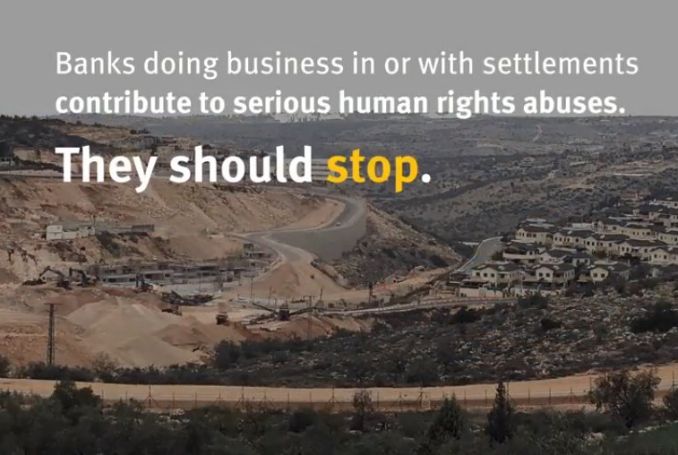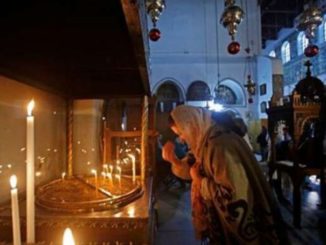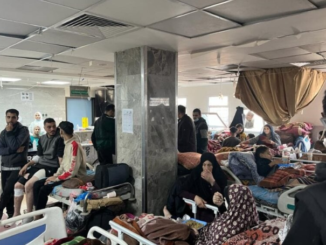
Most of Israel’s largest banks are providing services that help support, maintain, and expand unlawful settlements by financing their construction in the occupied West Bank, Human Rights Watch said in a report released today.
The 41-page report, “Bankrolling Abuse: Israeli Banks in West Bank Settlements,” details new research on the scope of banking activities in settlements and the violations to which these activities contribute. Israel’s seven largest banks provide services to settlements.
The report also documents the involvement of most of them in building housing units that expand settlements by acquiring property rights in new construction projects and shepherding the projects through to completion.
Daily Brief: "Bankrolling abuse" in West Bank settlements; FIFA's promises face Russia World Cup test; confiscating property in Syria; silencing NGOs in Hungary; crackdown on Saudi's women activists; & African Union's "window dressing" over sexism fears
https://t.co/Jx6gqBqWIe pic.twitter.com/ThNe3UpflB— Human Rights Watch (@hrw) May 29, 2018
“Israeli banks are partnering with developers to build homes reserved exclusively for Israelis on Palestinian land,” said Sari Bashi, Israel and Palestine advocacy director at Human Rights Watch.
“The projects these banks underwrite contribute to displacing Palestinians unlawfully.”
Human Rights Watch searched online listings for settlement construction projects, Palestinian and Israeli land and municipal records and construction company reports, interviewed landowners, visited settlement construction sites, and reviewed research on banking activities and land status by the Israeli nongovernmental organizations (NGOs) Who Profits and Kerem Navot.
New report by @www11be shows links between major European banks like Deutsche Bank, BNP Paribas and Israeli banks facilitating war crimes by partnering to expand Israeli settlements: https://t.co/tNMjBpnYzw.
— Sari Bashi (@saribashi) May 29, 2018
A map created by Human Rights Watch provides a partial picture of the financial services the banks provide throughout West Bank settlements. In addition to construction projects, banks provide loans to settlement regional and local authorities and mortgage loans to home-buyers in settlements and operate bank branches there.
Palestinian West Bank residents, forbidden by military order to enter settlements except as laborers bearing special permits, cannot use these services. Palestinian and foreign banks provide services to Palestinian customers outside the settlements.
Banks that finance or “accompany” construction projects in the settlements become partners in settlement expansion, supervising each stage of construction, holding the buyers’ money in escrow, and taking ownership of the project in case of default by the construction company.
The Aamer family used to walk 20 minutes from their West Bank home to their farm. Then Israel built a settlement on part of it, with help from Israeli banks. Now it’s a 2-hour detour to what’s left of their land. New @hrw research, with @KNavot data. https://t.co/YvaqcBQJt4 pic.twitter.com/xa3Xc0LMXw
— Sari Bashi (@saribashi) May 29, 2018
Most of that construction is on what the Israeli authorities declared to be “state land,” which can include land unlawfully seized from private Palestinian landowners. Israel uses this land in a discriminatory fashion, allocating one third of state or public land in the West Bank, not including East Jerusalem, to the World Zionist Organization and just 1 percent for use by Palestinians.
In the Palestinian village of Azzun, for example, Murshed Suleiman’s family lost regular access to their land when Israel erected its separation barrier between Azzun and the nearby settlement of Alfei Menashe, on the Israeli side. Bank Leumi, Israel’s second largest bank, is partnering with an Israeli construction company to build five new buildings in this settlement, on land that belongs to Azzun.
On Tuesday, @hrw will release a new report detailing the depth of involvement of major Israeli banks in illegal settlements. These banks are profiting from and contributing to grave rights abuses. Stay tuned. pic.twitter.com/niE7N8TYZL
— Omar Shakir (@OmarSShakir) May 27, 2018
Just outside the Palestinian village of Mas-ha, Mizrahi Tefahot, Israel’s fourth largest bank, is accompanying two new housing projects, with a total of 251 housing units. The project essentially expands the settlement of Elkana toward Mas-ha, exacerbating restrictions on land access.
The Aamer family has largely lost access to what had been about 500 dunams (50 hectares) of their land. Family members say that part of the new construction is on land that their father bought but has been seized without their permission and is now off-limits to them.
New @hrw report – 'Bankrolling Abuse: Israeli Banks in West Bank Settlements'.
"Most of Israel’s largest banks are providing services that help support, maintain, and expand unlawful settlements by financing their construction in the occupied West Bank"https://t.co/jL2jU7jLqM pic.twitter.com/0WRgecZtFy
— Ben White (@benabyad) May 29, 2018
“Banks cannot do business in settlements without contributing to discrimination, displacement, and land theft,” Bashi said. “To avoid this outcome, they should end their settlement activities.”
(HRW, PC, Social Media)







